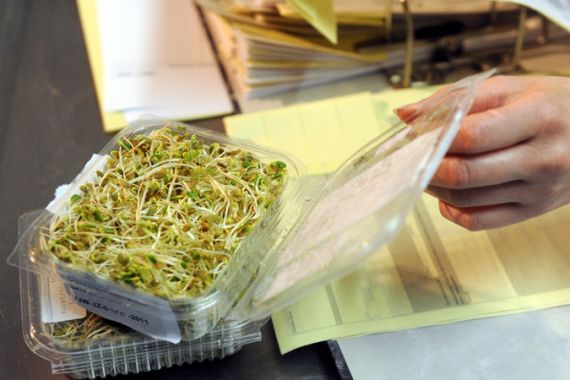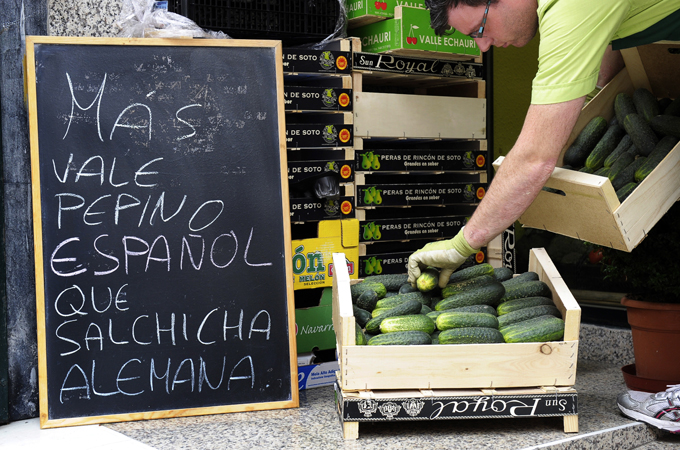EU ministers to meet on E.coli outbreak
Officials expected to provisionally agree on compensation package for farmers hit by sales losses.

 |
| The outbreak has sparked a row between Spanish and German authorities over the alleged source of the bacteria [EPA] |
European Union agriculture ministers are expected to reach a provisional agreement on how to compensate farmers hit by the E.coli outbreak.
Ministers will hold an emergency meeting in Luxembourg on Tuesday to discuss the crisis, which has left 22 people dead, more than 2,000 ill and crippled exports in the region.
Farmers are reported to have lost millions in exports over the outbreak, with Fepex, Spain’s fruit and vegetable industry group, saying $256m had been lost in exports amongst its growers.
German, Dutch, Belgian and Portuguese producers have also been affected.
The European Commission said the structure and specific amounts of aid being discussed on Tuesday had not yet been decided.
“I’m not sure that we will actually have a legal proposal on the table [on Tuesday] … I think our hope is that we can reach an agreement in principle,” Roger Waite, the Commission’s agriculture spokesman, told a press briefing in Brussels.
The ministers will also be reviewing the EU’s food safety alert system, in order to ensure that public warnings have “scientific basis and proof”, John Dalli, the EU health commissioner, said.
Scientists and health authorities have been struggling to determine the source of the outbreak, with the most recent theory that the harmful bacteria came from organic bean sprouts.
German scientists said that while they found no traces of E.coli at an organic vegetable farm that was believed to be the source, the test did not disprove their theory. They said the contaminated produce could have long since been distributed.
“This is an important lead that we’re vigorously pursuing,” Ilse Aigner, Germany’s federal agriculture minister, said in Berlin on Monday, after 23 samples tested at the farm had come out negative.
She repeated warnings to consumers to avoid eating bean sprouts, cucumbers, tomatoes and salad.
Scientists say the contamination may have come from the seeds in the beans, the water used to grow the sprouts or even from a worker who was in contact with them.
“Bean sprouts are not an uncommon cause of food poisoning,” Paul Wigley, from the University of Liverpool’s School of Veterinary Science, told the Reuters news agency.
“Both E.coli and Salmonella outbreaks have been linked to sprouts in the United States and in Britain,” Wigley said, adding that the US Centers for Disease Control (CDC) and the US department of agriculture have long since been concerned regarding risks involving bean sprout production.
Andreas Hensel, the head of the German Federal Institute for Risk Assessment, has admitted that “it is possible we shall never be able to identify the source” of the contamination, however.
Rancour in EU
A EU source in Brussels told Reuters that the most likely solution in terms of a compensation package would be the extension of an existing EU crisis prevention scheme that compensates farmers who have withdrawn their products from the market.
Under that plan, EU producers would receive about 30 per cent of the total value of unsold produce until June 30 in financial aid paid directly from the EU budget, the source said.
Spain has threatened legal action against German regional authorities for wrongly identifying Spanish cucumbers as the source of the contamination. It says that the German authorities must recompense Spanish producers in full for any losses incurred as a result of their incorrect warning.
Freshful, a EU-wide fresh produce association, said the latest national estimates put the weekly economic damage to Spain at about $291.7m, to the Netherlands at $116.68m, to Germany at $29.17m, to Belgium at $5.83m and to Portugal at $4.38m.
EU trade in fresh fruit and vegetables is worth about $3.64bn per week, and the fresh vegetable sector has been hardest hit by the crisis, Freshful said.
Strain ‘found only in humans’
The current outbreak has hit at least 14 countries, including the United States, though all fatalities have been directly linked to Germany.
In that country, 1,601 patients have been diagnosed as being infected, with a further 630 said to be suffering from haemolytic uraemic syndrome (HUS), a life-threatening condition involving kidney malfunction, the Robert Koch Institute said.
On Tuesday, Taggesspiege, a German newspaper reported that the E.coli strain involved in the outbreak, known as EAEC, is only found in humans, rather than animals.
Dr Lo Wing Lok, an infectious disease specialist in Hong Kong, told Al Jazeera that while the infection can spread relatively easily due to the free travel of goods and people around the world, the measures one can take to protect oneself are also quite simple.
“[The measures are] to cook our vegetables [and] meat thoroughly before eating. E.coli is highly susceptible to heat, the measures are as simple as that,” he said.